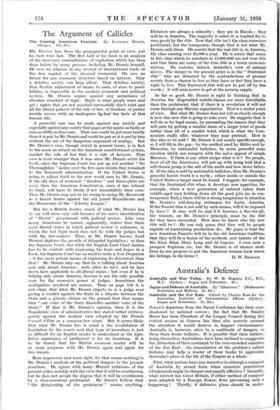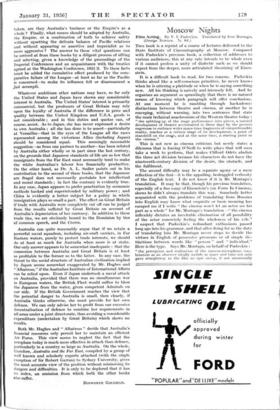Australia's Defence
Australia and War Today. By W. M. Hughes, Pk., K.C., M.P. (Sydney : Angus and Robertson. ()s.) Japan and Defence of Australia. • By "Albatross." (Melbourne: Robertson and Mullens. 2s. 6d.)
Australia and the Far East. Edited by Clunies Ross for the Australian Institute of International Affairs. (Sydney Angus and Robertson. 7s. 6d.)
JAPAN'S departure from the Naval Conference has been. over- shadowed by national sorrow ; the fact that "Mr. Stanley Bruce has been President of the League COnnell during this critical session at Geneva has thus also scarcely aroused the attention it would deserve in happier circumstances. Australia is, howeVer, alive to a multitude of dangers; as these three book's' indicate. It is possible that their anthers, being themselves Australians, have been inclined'to exaggerate the attraction of their continent to the over-trOwded countries of the Far East. An examination Of the problem's salient features may help .a reader of these books to appr6diate Australia's place in the life of the Empire as a
First, what nations have any incentive to attempt a conquest , attempt
of. Australia_ by armed force when economic penetration (if tolerated) might be cheaper and equally effective ? Secondly, what interest has Great Britain, if either method of conquest were adopted by a Foreign Power, from preventing such a happening ? Thirdly, if defensive plans should be under- taken, are they Australia's business or the Empire's as a whole ? Finally, what means should be adopted by Australia, the Empire, or a combination of both to achieve safety without upsetting the delicate balance of Pacific relations and without appearing so assertive and imperialist as to seem aggressive ? The answer to these vital questions can be arrived at from these books by a diligent process of sifting and selecting, given a knowledge of the proceedings of the Imperial Conferences and an acquaintance with the treaties agreed at the Washington Conference, 1921/2. To these facts must be added the cumulative effect produced by the coin- parative failure of the League—at least as far as the Pacific is concerned—to make its influence felt or disarmament a fail accompli.
Whatever ambitions other nations may have, so far only the United States and Japan have shown any considerable interest in Australia. The United States' interest is primarily commercial, but the producers of Great Britain may rely upon the loyalty of Australia if the difference in price and quality between the United Kingdom and U.S.A. goods is not consideralile ; and in this duties and quotas can, of course, assist. As to Japan, she has never expressed a desire to own Australia ; all she has done is to assert—particularly at Versailles—that in the eyes of the League all the races represented among the victorious Allies (Including Japan) should be considered equal. This seemingly reasonable suggestion—as from one partner to another—has been refuted by Australia either wholly or in part since the last century, on the grounds that Japanese standards of life are so low that immigrants from the Far East must necessarily tend to make the white Australian's labour less financially productive. On the other hand, as Dr. A. L. Sadler points out in his contribution to the second of these books, that the Japanese are frugal does not necessarily postulate low intellectual and moral standards ; in fact the contrary is evidently true. In any case, Japan appears to prefer penetration by economic methods backed and superintended by military power ; and China is evidently a better subject for a policy in which immigration plays so small a part. The effect on Great Britain if trade with Australia were completely cut off can be judged from the results suffered by Great Britain on account of Australia's depreciation of her currency. In addition to these trade ties, we are obViously bound to the Dominion by ties of common speech, and the Crown.
Australia can quite reasonably argue that if we retain a powerful naval squadron, including air-craft carriers, in Far Eastern waters, purely to protect trade interests, we should do at least as much for Australia when more is at stake. Our only answer appears to be somewhat inadequate : that the connexion between Australia and Great Britain is at least as profitable to the former as to the latter. In any case, the threat to the social structure of Australian civilisation implied by Japan seems somewhat exaggerated by Mr. Hughes and "Albatross," if the Australian Institute of International Affairs can be relied upon. Even if Japan undertook a naval attack on Australia, provided that there was no simultaneous war in European waters, the British Fleet would suffice to blow the Japanese from the water, given competent Admirals on our side. If the British Government reaches the view that the potential danger to Australia is small, then clearly, if Australia thinks otherwise, she must provide for her own defence. We can only advise her to profit from our excessive decentralisation of defence to combine her requirements in all arms under a joint directorate,, thus avoiding a considerable expenditure (undertaken by Great Britain) which shows no results.
Both Mr. Hughes and " Albatross " decide that Australia's financial resources only permit her to maintain an efficient Air Force. This view seems to neglect the fact that the aeroplane today is much more effective in attack than defence, Particularly in a country so large as Australia. On the whole,
therefore, Australia and the Far East, compiled by a group of well known and scholarly experts attached (with the single exception of Sir Robert Garran) to Sydney University, gives the most accurate view of the position without minimising its dangers and difficulties. It is only to be deplored that it has no index, an omission from which both the other books also suffer.
BOSWORTH GOLDMAN.











































 Previous page
Previous page